#Ayodhya News Today
Text

Discover the divine connection! Munindra Rishi's meeting with Hanuman Ji revealed in the sacred text 'Jeene Ki Raah Kabir Sagar.' Dive into Chapter 12 on page 113 for enlightenment. Unveil the spiritual journey! After his expedition from Ayodhya, Hanuman Ji encountered Munindra Rishi in his divine form. Explore this captivating narrative in Kabir Sagar's chapter 'Hanuman Bodh.' Embrace the shelter of the Almighty! Witness the episode where Pavanputra Hanuman Ji finds refuge in the arms of the Supreme Being, beautifully portrayed in Kabir Sagar's 12th chapter.
#अयोध्यासे_जानेकेबाद_हनुमानको मिले पूर्ण परमात्मा Kabir Saheb ji 🙇♀️
#satlokashram#spiritual awareness#kabirisgod#sanatandharma#spiritual warfare#supreme god kabir#spiritual development#kabir is supreme god#allah is kabir#santrampalji_avatarandiwas#hanuman#hanumaan#ram mandir#ramnagar#ayodhya#treta#tumblrpics#tranding#festival#bhakti#satlok ashram news#satbhakti sandesh#tuesdaymotivations#tuesdayfeeling#tuesday spoilers#tumblrlife#tummy tuesday#today on tumblr#tumblr milestone#artists on tumblr
5 notes
·
View notes
Text
up top news today 05 may pm modi road show ayodhya loksabha election campign cm yogi akhilesh yadav mayawati
UP Top News Today 05 May 2024: Prime Minister Narendra Modi took out a road show in Ayodhya at around 7:55 pm on Sunday evening. This roadshow, about two kilometers long, will be taken out from Sugriva Fort to Lata Chowk. Before taking out the road show, PM Modi went to Ram temple and had darshan of Ram Lalla as per the rituals. PM Modi had come to see Ramlala for the first time after his…
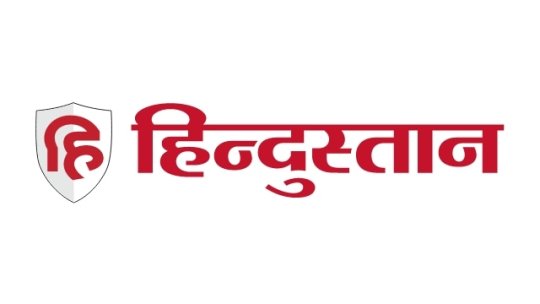
View On WordPress
#modi#Akhilesh#Akhilesh Yadav#ayodhya#campign#Election#Hindi News#Hindustan#lok sabha elections 2024#Lok Sabha Elections Third Phase Election Campaign#Loksabha#Mayawati#News#News in Hindi#road#show#today#top#UP Top News#Yadav#Yogi#Yogi Adityanath Public Meeting
0 notes
Text
Ram Mandir Inauguration: PM Modi's 10 Empowering Messages
Ram Mandir Inauguration today is a historic moment for India. Prime Minister Narendra Modi delivered a historic address to a gathering of 7000 including devotees, celebs and who is who of society after the Pran-Pratishtha event at the Ayodhya Ram Mandir, marking a significant moment in India’s cultural and religious history.
In his speech, the Prime Minister declared, “January 22, 2024, is not…

View On WordPress
#ayodhya#ayodhya live#ayodhya ram mandir#ayodhya ram mandir inauguration#ayodhya ram mandir live#ayodhya ram mandir news#modi speech#modi speech today#Narendra Modi#narendra modi speech#pm modi ayodhya#pm modi ayodhya speech#pm modi in ayodhya#pm modi speech#pm modi speech today#PM Narendra Modi#pm narendra modi speech#pm narendra modi speech latest#Pran-Prathishta#prime minister narendra modi#Ram Lalla#ram mandir ayodhya#ram mandir ayodhya live#Ram Mandir Ceremony#ram mandir in ayodhya
0 notes
Text
#purvanchalsamachar#india news#up news#ayodhya ram mandir news#today noida news#noida news#ram jam bhumi news#ram mandir news
0 notes
Text
ताश के 52 पत्ते व माल फड 11200 रुपये नकद के साथ 06 नफर अभियुक्त गिरफ्तार
डिस्ट्रिक ब्यूरो चीफ इंद्रेश यादव की रिपोर्ट
थाना बीकापुर/ अयोध्या: जेडवरिष्ठ पुलिस अधीक्षक राजकरन नय्यर जनपद अयोध्या के आदेश के अनुपालन मे अपराध एवं अपराधियो के रोकथाम हेतु चलाये जा रहे विशेष अभियान के तहत पुलिस अधीक्षक, ग्रामीण अतुल कुमार सोनकर एवं क्षेत्राधिकारी बीकापुर डा0 राजेश तिवारी के पर्यवेक्षण मे प्रभारी निरीक्षक बीकापुर के नेतृत्व मे बीकापुर पुलिस टीम द्वारा दिनाँक 1.8.2023 को मुखबिर…
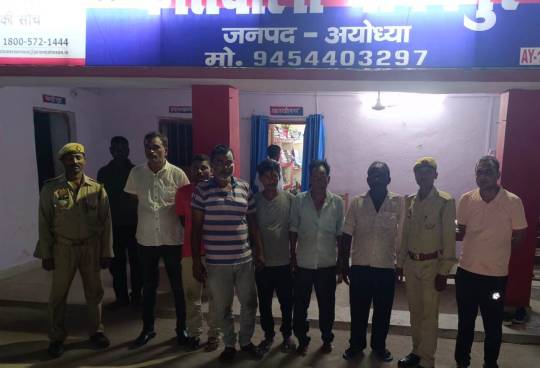
View On WordPress
0 notes
Text
DAY 5836
Jalsa, Mumbai Feb 9/10, 2024 Fri/Sat 9:54 AM
First .. a very sad news .. 😔
Extremely sad to come to know about the sudden passing away of Ef Hany Sabri from Egypt .. one of the oldest and most dedicated Ef from Egypt .. passed away last night due a sudden heart attack .. the news is shocking .. our heartfelt condolences and prayers for his family and dear ones .. 🙏🏼😔
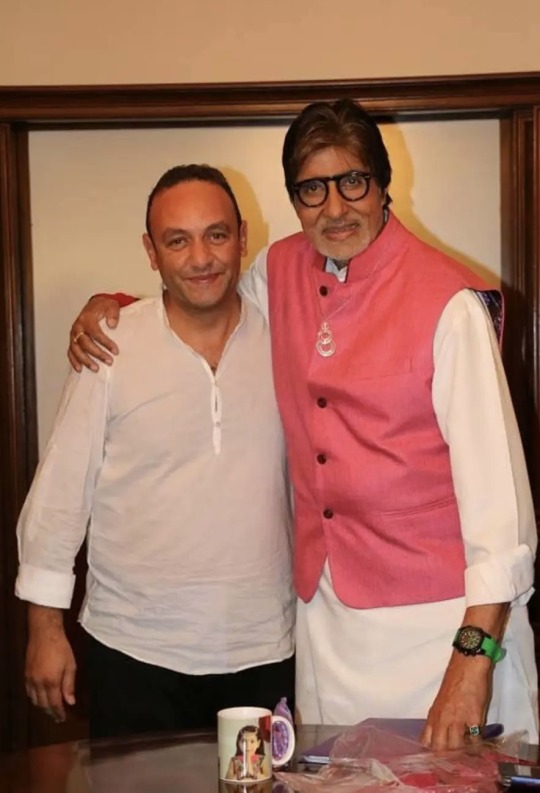
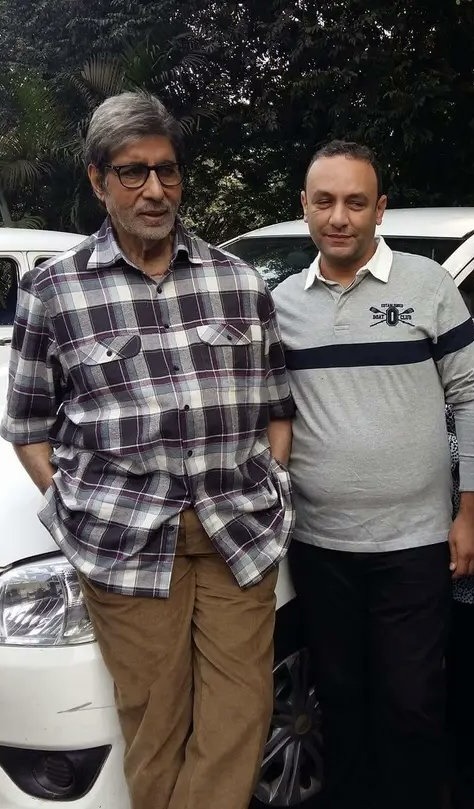
... they had all come from Egypt to visit me in Kolkata when I was shooting for 'Teen' ..
Hard to say anything after this .. but life goes on .. and hence the wishes to the Ef continue .. though they be silent wishes today in respect to the Soul of the departed Ef .. 🙏🏼😔
🪔 ,
🪔 ,
February 09 .. birthday greetings to Ef Pinakin Gohil from Bhavnagar, Gujarat ..
February 10 .. birthday greetings to Ef Rahul Sen from Kolkata ..
Wedding anniversary greetings to Ef Anat and her husband Daniel from Israel .. completing 22 years of marriage .. on February 10 .. 💐🙏🏼❤️
Wedding anniversary greetings to Ef AMIT Kumar joshi from Bikaner .. for February 09 .. love always .. 💐🙏🏻❤️
yes it does become at times insensitive and difficult to express after the passing of a friend and a member of our Ef .. but our prayers as ever ..
there is much to say but .. for the moment ..
A travel to the God's again .. Ayodhya .. and back by the late evening .. sublime , serene , and filled with the reverence that divinity has ever instilled in us all ..
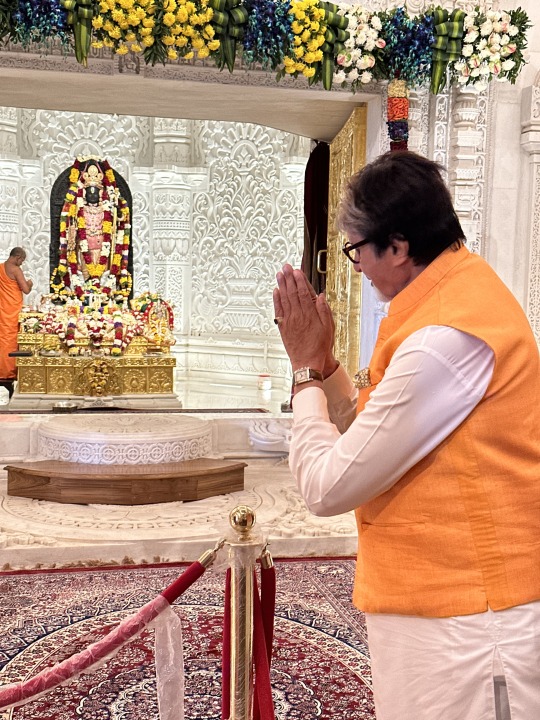
Love and may the blessings pf the Almighty be within us all ..
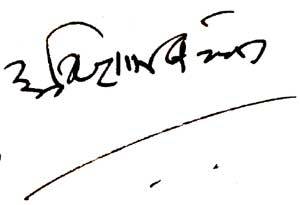
Amitabh Bachchan
137 notes
·
View notes
Text
Resources to learn more about Hinduphobia, and Hindu culture.
Making a masterpost about this because I'm getting a lot of asks for it. The list will be updated!
Books to read:
Not Without My Daughter by Betty Mahmoody. This is the memoir of a woman stuck in Iran and how she has to illegally sneak out with her daughter. It doesn't focus on Hinduphobia but it does highlight the violence perpetuated by Muslims to women. This is a true story and a movie has also been made on it. Also, I just need to appreciate how well it's written, I was on the edge of my seat the whole time.
Aavarna by S. L. Bhyrappa. This book basically details how Hindu history was derailed and destroyed by Mughal invaders, specifically Aurangzeb, the plot is fictional but the history is real.
All Religions Are Not the Same by Sanjay Dixit. This is a new book and I've just ordered it actually. It discusses the differences between religions and how secularism affects that.
Why I Killed Gandhi by Nathuram Godse. Includes the testimonial of the man who killed Gandhi. I'm about to read this book and I'm excited. Don't be fooled by the one-star reviews.
Some people you can follow on Twitter are Dr Anand Ranganathan, The Skin Doctor, and VivanVatsa. They're all well-read on Hinduphobia and/or Hindu history. Anand Ranganathan also has published books on Hinduphobia, like Hindus in Hindu Rashtra.
Blogs you can follow for awareness, and learning about Hinduphobia/Hindu culture:
@rhysaka (debunking common myths, awareness)
@magic-coffee /@vindhyavasini(debunking common myths, awareness, politics/geopolitics, news, culture)
@anjanadri (debunking common myths, awareness, culture)
@latent-thoughts (history and explanations, culture)
@forgotten-bharat (amazing for the history of ancient India, and culture)
@misalpav (culture, awareness)
Interesting masterposts from other blogs:
Booklist to learn more about Hindu History by @magic-coffee
The Ayodhya Masterpost by @magic-coffee
Some important Hindu literature:
Mahabharata
This is classified as an Itihasa text. It deals with a war between 2 royal factions and is a vehicle for describing the activities of the Avatar Krishna.
Ramayana
This is also an Itihasa text. It provides the biography of Lord Rama who is considered an Avatar of Vishnu.
Bhagavad Gita
This is an important text of the Vedanta school and is treated separately although it is part of Mahabharata. It provides a coherent summary of Vedanta.
Srimad Bhagavatam
This is a Purana and provides a biography of Lord Krishna. This is an important text for the Vaishnava sect of Hinduism.
Shiva Purana and Linga Purana
These Puranas provide the biography of Lord Shiva and are important texts for the Saivite sect of Hinduism.
Chandi or Devi Mahatmyam
This is an important text for Saktas who worship Sakti or Devi. This text is really part of the Markandeya Purana.
But really, the best way to combat Hinduphobia, is to learn about our history and culture, because if you know the truth, you won't fall for the twisted narrative being peddled by the media today. If you've got to the end of this, thank you for educating yourself and learning about us.
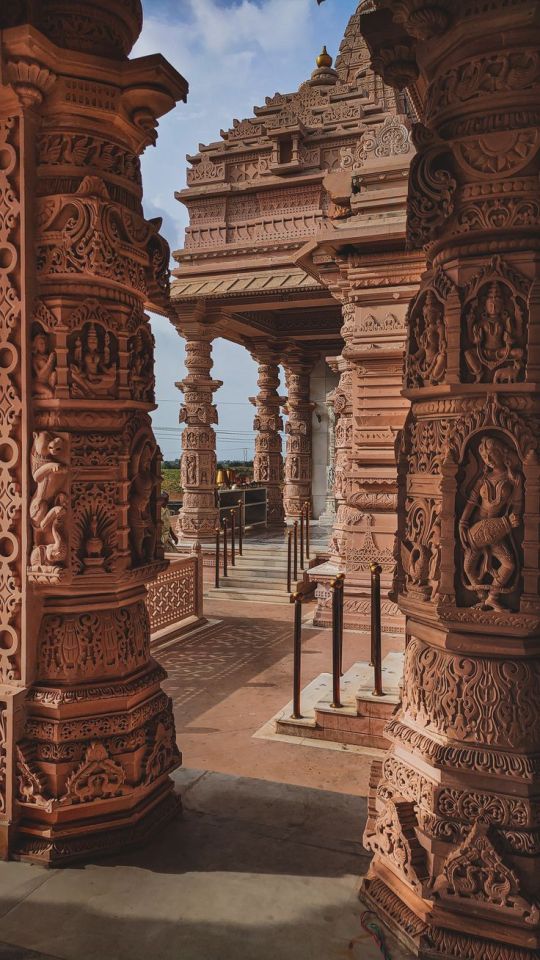
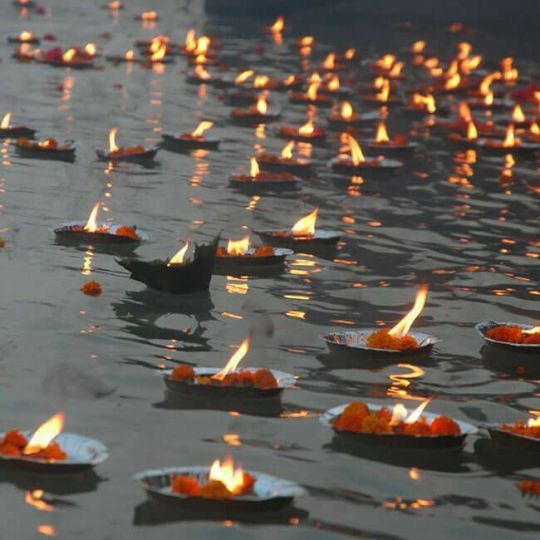
106 notes
·
View notes
Note
hi, can i request something? i was thinking that we don't get to see rama hearing about sita (who's miraculous birth and deeds must have been stories that spread to ayodhya as well as other kingdoms) before they meet as we do see sita hearing about rama and admiring him in adaptations. so, it would be great if you could write an au on 5 times rama heard about sita and 1 time he told someone about her (maybe luv-kush or hanuman/the vanaras). thank you!
Hello there! Thanks for the ask, this was very interesting to write, and I discovered I have so many opinions and headcanons about a bunch of characters and their relationships I could make a whole entire post out of it. Also, this is a 4k+ monster, so beware :D
1.
“They found her where?”
Rama looks up from his dessert blearily to where Bharata is frowning at their King Father. It is a sweet spring morning, and their family is gathered around the table breaking their fast. Beside his drooping self, Lakshmana bounces restlessly.
“I want the curd,” he whines.
Mother Kaikeyi answers her son as she passes the dish over. “She was buried in the earth, and King Janaka found her under the plough.”
“How was she not mowed down? Do people stare at the ground as they plough? Why did the oxen not trample her? How did she survive in the heat? Who put her- ”
“Bharata,” Mother Kaikeyi frowns at him. “One question at a time. Someone must have left her there – a god, perhaps, or some poor peasant who did not have money to feed a child. How she survived the heat and the yoke and the oxen I do not know. A miracle, clearly, and proof that the child is blessed.”
“I hope Janaka raises her as his own,” Mother Sumitra says, waving her hand vaguely in the air, “since he found her and everything.”
“Found who?” Rama asks at last, finally interested in the conversation.
“A baby,” Shatrughan grouses. He is five summers old and has formed many opinions on babies ever since Shanta didi brought Rahul over; not one of them is complimentary. “I do not understand what the fuss is all about. Surely, it is as ugly and dirty as all others.”
Mother Koushalya laughs. “You know, a mere couple of years ago, you were a baby yourself.”
“Ew.”
“Now, now,” Father chides him. “Mithila is suffering from terrible droughts. Mayhaps the child will bring them good luck.”
“That is an awful lot of hope to pin on a babe,” Mother Sumitra remarks, cynical as ever.
There is a blessed silence as everyone contemplates this. Mithila falling out of Indra’s favour is old news; over the past years many messengers have come and gone from Ayodhya’s royal court, and many carts have rolled between the two kingdoms, bearing grains that would never be enough. Mithila had enough fertile lands to feed herself, but her people were more inclined to knowledge and learning, and rarely took up tools to divert rivers or dig canals. The seasonal monsoons watered most of their lands; without it the crops had withered and burnt in their fields, and the hard earth cracked open to gaping maws unsuitable for any agricultural endeavor. That a mere girl, however divine-born she might have been, could cure such a calamity…
“In any case,” Mother Koushalya says primly, giving their father A Look, “let us hope King Janaka will take her for the blessing she is. Daughters are not to be forsaken.”
Father sighs. “Dear, please…” he murmurs, then quails under his wife’s glare. Daughters are a sore subject between Ayodhya’s King and her eldest Queen.
“Do we know what her name is?” Rama asks, and Mother Kaikeyi smirks at his unsubtle attempt to steer the conversation away.
Dasharatha latches onto the distraction with both hands. “Whose name? The girl’s?”
Rama nods.
“They named her after the furrow she was found in.”
“Oh?”
“Mhmm,” Dasharatha smiles. “She is called Sita.”
2.
It is late when Guru Vishwamitra decides to halt for the night and invites the brothers to sit by their little fire.
“You did well today,” he says, and Rama thinks the sage almost looks pleased.
“It was all your blessings, Guruji,” he demurs, “and that of our parents’.”
Beside him Lakshmana supresses a snort, noting how he left Guru Vashistha out of the mix. While their companion ruminates on this with a beatific smile, his brother whispers in his ears, “You are going to be a great politician one day.”
Rama elbows him. Lakshmana elbows back, and then it is a boyish game that is barely discreet. Rama can feel the beginnings of a smile twitching on his face.
They are interrupted by Guru Vishwamitra, who folds his hands sternly over his lap, turns to them, and asks, without the barest hint of hesitation, “Say, Rama, have you ever thought of marriage?”
Rama sputters. Beside him, Lakshmana tenses, prepared to fend off any and all questions until Rama decides what to answer, like he always did back in Ayodhya, because Rama has the best brother in the whole wide world. But Guru Vishwamitra rolls over any protests.
“We shall stop at Mithila next, and the noble King Janaka has under his care four comely young maidens – two his own, and two his brother’s.”
The crickets chirp in the shadow of the forest. Rama stares, unblinking and silent.
“Forgive my impudence, revered one,” Lakshmana says at last, when it becomes evident that Rama will not answer, “but my brother believes it is improper to speak of such matters without consulting our elders.” His brother chances a glance at him. “And he also thinks the man and the woman should get to know each other beforehand.”
The last part is entirely Lakshmana’s own addition, since he despises the idea of marriage and has long hoped to turn away any potential suitors by acting churlishly. That is unlikely to happen, given that few fathers care for their daughters’ opinions, and Lakshmana is charming even in his devilry. Rama refrains from mentioning any of this, especially because Lakshmana has clearly caught the ‘four maidens’ comment.
Guru Vishwamitra nods, meanwhile, as if he has expected something such all along.
“That is all very well, my boy, but let me tell you this. Janaka’s eldest child is the mightiest woman to ever walk upon Aryavart, and the most virtuous. When she was yet a child, she lifted with one dainty hand the Destroyer’s bow. Then her father declared that such a maiden’s hand may only be claimed by one who could perform a similar feat.”
“How… awe-inspiring,” Rama manages at last, already daunted by the thought of this princess.
Guru Vishwamitra smiles. It is the kind of smile that Shatrughan has when someone is about to find dead fish among their clothes.
“Do not worry about your father,” the sage says nonchalantly. “We shall reach Mithila by tomorrow. Look sharp, Rama, it is the princess’s Swayamvar. You will lift the Pinaka, and then knowledge and valour shall be wedded, and what a joyous day it shall be! Do you not agree?”
“Ah, Guruji,” Rama gropes about for anything that will dissuade him. “The Pinaka is a legendary bow, and I am but a young boy.”
“I have faith in your ability, Bhaiyya,” says the traitor heretofore known as Lakshmana, Rama’s brother, “and as he told you, our Guru thinks similarly.”
“I do not even know her name,” Rama says, desperately elbowing Lakshmana when the latter starts to snicker.
Their Guru shrugs. “That is easily solved. She is called Sita.”
3.
Rama is broken. There is no other way to put it – this empty haze that mars his sight, this endless sorrow that mires him down, this bleak, bleak search that shall never end – Rama is irrevocably ruined.
He feels nothing save grief and rage, and knows nothing save that they must go on and on and on, till they have eclipsed the earth thrice over, till they have searched every nook and cave and treeshade, pausing neither for food nor rest nor death.
He screams, sometimes at the forest and sometimes into the earth, and sometimes at foolish, foolish Lakshmana, who is so exhausted and so dear, and Rama thinks he knows what the Pinaka’s master will do at the breaking of the world, for he feels that catastrophe within the traitorous organ beating in his chest, calling through the bars of his bones like a forgotten prisoner, ‘Sita! Sita! Sita!’
“Bhaiyya, please,” Lakshmana begs, gripping his shoulders tighter than ever before.
Once Rama was stronger, but now he even struggles to loosen his hold. “Let me go,” he wails, writhing and unseeing. “I will not, I cannot- ”
“You need to, Bhaiyya,” Lakshmana insists, tightening his hands, pressing fingers to the hollow between Rama’s clavicle and collarbone.
Rama shakes like Mount Meru trembling under Sachi’s wrath. “I need to?” he demands. “I need to? Like you needed to leave Sita, needed to search for me, despite your faith in me, despite knowing that- ”
Lakshmana’s hands unclench, and Rama finds himself sinking. His gaze clears, little by little, and he hears his brother make a strange, muffled sound, and he is sinking to his knees, familiar hands guiding him, but no longer restraining. There is an Asoka’s trunk to his right, and he is made to lean against it, all gentle-soft and slow. When he looks up, Lakshmana’s face is turned away, tears leaking out of the corner of his eye, mingling with the blood on his chin from where he has bitten his lip to hold back a sob.
“Lakshmana,” he murmurs, reaching out to him, and oh, there are flecks of dried blood on his knuckles, and oh, Lakshmana’s temple is a sickly purple when he looks back, like the costliest dhoti muddied by rain, and when, oh, when did he strike the most beloved of brothers, and why?
Lakshmana is kneeling beside him, always one reverent inch behind the bend of his arm, running a thumb over the crimson remnants of violence.
“It was not your fault,” he soothes, lilting like a childhood song. “You did not see me coming.”
When? he wants to ask, how? But the haze returns like insidious tendrils of fog. He should be comforting Lakshmana, he thinks, for it was always his job to quieten his brother’s temper. Lakshmana needs comforting, he knows, but Lakshmana is not angry. Why, then…
Someone shakes his shoulder. “Bhaiyya?”
“Uh,” he offers intelligently.
“I am going to get some water, okay? Please, please do not leave. You need to rest awhile; we are no use to Bhabhi if we are dead.”
He waits for Rama to nod his assent, and leaves with tear-tracks on his cheeks. That was why Rama should have comforted his brother – Lakshmana was crying. And now he is gone, and Rama is seated under a tree waiting for him to bring water, like that blind old couple had so many years ago waited in vain for Shravana Kumara. They cursed his father for slaying the boy, and that curse drags ever on, even today. What would Rama do if some stray arrow found his brother’s heart? Would he curse the shooter, even if it was a chance of fate? No, he thinks, he would hunt them down, and then burn cursed Dandaka, all the way from the Vindhyas to the unresting sea, with every man and beast and rakhshasha in it.
Perhaps because he has such a keen ear, or perhaps because he is thinking about it, he hears a terrible, piercing groan, and shoots up. The sound comes again, and Rama runs. It does not occur to him that he runs the other way, or that he should take his bow. All he does is plough through the tall trees, tripping on roots and choking on outstretched branches, fighting against Aranyani’s will.
When he finally stumbles upon the body, all he can think of is that it isn’t Lakshmana. Then the groan comes again, and he rushes over to the feathered being, kneels by its side. Once, it must have been a great bird, but now there are only stumps where the wings would have been, and it has a gaping hole in its stomach.
“My dear,” Rama says, already knowing it beyond saving, “rest. All will be well.”
To his surprise, the bird opens its eyes. “Who are you?” it asks, in a distinctly masculine voice.
“Rama, son of Dasharatha,” Rama says, and looks up to some scuffling. “That is my brother, Lakshmana,” he adds, as said brother tumbles into the clearing with wide eyes, twin bows and ruffled hair.
“Dasharatha?” Clarity rushes to the bird’s eyes. “Once, I, Jatayu, named him friend. Wait, you are Rama and Lakshmana? That woman called for you.”
“So we are,” Lakshmana agrees, kneeling as well. “What woman sought us, noble Jatayu?”
“The fairest of them,” Jatayu says, “with the darkest curls and most beautiful mien I ever knew. She wept from the perch of the Pushpaka Vimana and called high and low for aid, even as Ravana took her ever southward to his golden state. I sought to free her, friends, and so I fell wingless from the sky.”
Rama dares not hope, dares not breathe. “Southward?” he asks, settling on the least painful, and most important detail.
“Southwards to Lanka,” Jatayu explains, words slurring again, “to that seagirt island he names his own. I shall not be here long, but I beg you, make haste my friends.”
There is a noose uncoiling from Rama’s chest. He needs to thank Jatayu for his aid, for trying to save his wife, for being their father’s friend; he needs to make sure he passes away in peace. And he will do it all, only after one last question.
“Do you know who she was?”
“Mhmm,” Jatayu hums. “She called herself Sita.”
4.
Hanuman leads them up Mount Rishyamukh with nimble leaps and fleet feet. Rama and Lakshmana toil behind, each hard-faced so as not to give away how strenuous they find all this jumping.
“I feel like a stray goat,” his brother mutters, teeth clenched to hold back huffs. “He is showing off for you, and naturally, I am the one caught in the middle.”
“If you think I am enjoying this…” Rama begins, then sighs to mask his panting.
“Then why do you not ask our guide to slow down? He seems to like you well enough.”
Rama snootily turns his nose up in the air. “We are the scions of Ikshvaku, heirs of the Raghu clan. We must endure.”
“You mean you must endure.” Lakshmana’s voice is sardonic as he continues, “If my honour comes from attempted suicide by heat exhaustion, I care little for it.”
“If I have to climb up this thrice-damned mountain without protest, then so will you.”
Silence. Rama turns, alarmed, half afraid his jesting has been taken seriously. They have not spoken about everything that came to pass in the weeks before meeting Jatayu, and although Lakshmana’s bruise has long healed, Rama’s heart has not. But no, his brother is smirking and shaking his head, and when Lakshmana speaks, his voice quivers with mirth. “You are mean.”
Rama exhales, yet relief does not come.
“Lak- ” he begins, but is immediately interrupted by a joyous shout from above.
“Prabhu!” Hanuman beams down at them, “We are here.” Then he turns and addresses someone else, “Oh, please do tell Maharaj Sugriva, he shall be most elated.”
Lakshmana eyes the remaining steps and then surveys the distance they have come.
“This should not have been so difficult,” he mumbles, and Rama is inclined to agree. Once the two of them could have scaled the peak without breaking a sweat and run three miles afterwards. All that crying and bumbling about the forest must have made them soft.
Sugriva – dressed in old finery and worn purples – comes to meet them in a great, cavernous hall, reeking of cheap wine and misery. The crown on his head is scratched and askew.
“Show them what we found,” he tells one of the attendants, after Hanuman has recounted their tale of woe, and nods to them. “Please, have a seat, my lords.”
Rama sits and tries not to quiver with anticipation. This is it. He can feel it in the air – this is the key to rescuing Sita. Lakshmana stands by his side, half a step behind, and places a hand on his shoulder.
“We found them on the ground,” Sugriva says, tail flicking nervously. “By the time I was called, it was all over, but my Vanaras say a great golden chariot had flown across the skies, and from it came the weeping of a maiden most fair.”
He pauses, as a worn pouch is brought in, and a bearer places tall earthen glasses of drinks before them. Rama ignores the latter and reaches for the pouch.
“This has the ornaments you found?”
“Yes.”
Rama pulls apart the string holding it together and turns it over on his palm. A familiar necklace falls out, thick and glittering gold, followed by a lonely earring, a chain, and an anklet strung with little bells.
Rama stares.
“Prabhu?” Hanuman probes. “Are these the ones you seek?”
“Yes,” he breathes, fingers trembling, stroking the trinkets as if they could somehow pass on his affection to their beloved wearer. “These are hers.”
He looks up to an assortment of pitying glances. They can tell the woman is someone important, though neither Rama nor his brother had revealed in as many words that Sita was his wife. Did they think of him an idiot, a desperate father, or a maddened brother, or a lovelorn husband clutching to circumstantial proof of a dear one’s presence?
As he has done these past weeks, and all their lives, Lakshmana comes to the rescue. “I recognise the anklet.”
Sugriva hesitates. “My Lord Lakshmana?”
“The anklet,” he repeats. “I saw it every morn when I knelt for her blessings. I would not confuse them for any other.”
“And the others?”
“Uh,” Lakshmana blinks. “I would not dare be so importune with a lady as to stare at her person” – here Rama catches Sugriva stiffen minutely, as a guilty man does when caught, but Lakshmana has spoken without malice, and it passes as quickly as comes – “but her sister has an earring of similar fashion.”
“You will not look at her but you will look at her sister,” Sugriva notes, and it is interesting how he has latched onto that.
Lakshmana turns pink. “I married her sister?” he says, phrasing it like a question, as if all those days with Urmila were a fever dream. Rama can relate.
There is an awkward pause, and his brother plows on with all the daintiness of the bulls that once ploughed the land Sita rose from. “What was she like?”
“I told you – I have not seen her. My people told me this: that she was the fairest maiden they ever beheld, shining like the sun at high noon, that her voice was like starlight, and that she called for the scions of Raghu to aid her. Twice she called for one Raghurai, and once for a Saumitra.”
Rama cannot help the smile on his face. Of course, Sugriva will surely ask for some terrible recompense, but he is an outcast King, and exiled besides. He will not shirk from helping.
Beside him, he feels his brother relax. “She is no mere maid,” Lakshmana drawls. “She is the daughter of King Janaka, of distant Mithila, and the wife of Rama, prince of Ayodhya. She is Sita.”
5.
Rama eyes the prodigious young twins seated on the floor of his court. They are young, barely a year older than Bharata’s oldest, and the sight of them makes something in Rama’s chest tremble. It has been a long time since he has been blessed with the sight of his wife, save in the terrible gilded statue that occupies her place beside him. Today, though, he sees her everywhere – in the curls of the twins' hair, in the way the older one smiles, and the younger wrinkles his nose. He sees her even in the way they hold their veena, which makes little sense, given that most people hold their instruments the same way.
They had introduced themselves as students of Rishi Valmiki, without any patronymic. That means nothing. They could simply be referring to the one who sent them here. But their mother must have been pregnant the same time as Sita, if age is any indication, and Sita had been having twins, and they did look awfully like her...
“Greetings, Your Majesty,” says Kusha, the older twin, his hair sticking up like the grass he was named for.
His voice is a blessing, for it derails Rama's terrible thoughts, and a curse, for it sounds so like Sita's that he may as well be in Mithila's gardens more than two decades ago, facing a demure princess who would later be his wife.
This is folly, he thinks, nodding at the young ones, permitting them audience.
Kusha continues, “Our Guru, the mighty sage Valmiki, was immensely inspired by your tale. Thus, he composed an epic, so all the world may remember the valour of Shri Rama.”
“It is still being written as we speak,” Luv says, picking up where his brother left, “but we have learnt in song all that was penned down before we departed. If His Majesty pleases, we would be honoured to present it to you.”
Rama stares, then hesitates. Seeking self-praise is the path to downfall, and the story is painful besides. All save Lakshmana look eager – even Urmila, though she must have been told everything, either by her husband or by Sita. He should praise their dedication and send them away with blessings and a few gifts. There is no point in unearthing such sorrow again, not when the story has no triumph, and Sita is not by his side.
Luv and Kusha look up at him, familiar doe eyes wide and beseeching. They are clutching each other’s hands, tense with anticipation. Rama opens his mouth to disappoint them, and instead says, “Very well, we shall hear you.”
He could have cursed himself them, but the answering smiles he receives wash away all self-recrimination.
The courtiers clasp their hands and lean forward, and the boys bob their heads in a semblance of a bow.
“Hear us,” Luv proclaims, “for we sing of Rama, son of Dasharatha, of blessed Ayodhya.”
It is a familiar tale, of the joys of his childhood and the days at the Gurukul, the love of his father and three gentle mothers. But Rama knows, the grief is about to come.
He allows a tremulous smile when they sing of Sita’s Swayamvara, for it was a joyous occasion. He holds his breath when Ravana of the tale carries Sita away, but pain lances through him only once. He trembles when they exalt Sita’s resolve in the face of misery, trapped in her golden prison, and shivers when they recount Lakshmana’s deadly injury.
But just as he thinks that perhaps, having lived through it once, he has numbed himself enough to be able to get through this without the waterworks, the song rolls to their victory, and to Sita’s freedom.
“And then Rama of the golden bow,” Kusha intones, “says ‘I have not yet sunk so low, to take back unquestioned a spouse that has lived a year in another’s house.’”
Half the court inhales, and Rama feels a telltale burn behind his eyes. What has he done? He wants to throw out the boys, forgetting his fondness for them, wants to scream and curse and run away. But he is an Emperor, and this is his court, and such behaviour is unbecoming. The lay turns stern and punishing, quickening to a chant.
Sita in the epic stands as straight and bold as she had all those years ago, before an army of thousands. Her hair is a riot of curls blacker than the length of Nisha’s dread night; her face is as gaunt as Dhumavati’s terrible mien. When she speaks her voice is Indra’s thunder across the sky, devoid of any love or affection. “If you shall question me, husband,” she says, “then may Agni judge me. Lakshmana, son, make me a pyre.”
Lakshmana of the tale weeps, as he does in real life, both then and now. And Ravana’s captive, all molten iron clothed in a delicate body, walks out of the pyre unblemished and unburnt, lit red and orange and yellow – a living flame. For she is Janaka’s daughter and Rama’s wife, but she is also the mightiest woman that Aryavart would ever know, and the most virtuous.
The song ends with exaltations of their victory, and the joy of reunion, but Rama, seated beside a lamentable golden mockery of a woman he once named his own, hears none of it. His tears come hot and unbidden, like summer tempests across the plain, and he weeps and weeps and weeps.
+1.
Luv kneels on the green grass, wide eyes following an eagle's flight across the sky. Rama strokes his head, soft and gentle and in love. It is a tranquil morning, and Rama wonders if he should postpone court to prolong this moment. Beside him, Kusha hums softly, sprawled over the grass.
“You look melancholic,” Rama observes.
Kusha shrugs. Rama has yet to learn all his son’s expressions, but this one he knows intimately. His son misses Sita. Now that she is not here, it is his duty to comfort him. The thought warms Rama's heart nigh as much as it chills.
“Your mother,” he begins, then hesitates, unsure.
Kusha sits up. “What of her?” he demands, cornered and defensive.
Rama holds up his hands, feels Luv’s glower boring into the side of his face. Sita is a sensitive topic, lying between them with the treachery of a coiled snake, defying the peaceful manner of its namesake.
“Would you like to hear about her?” he offers at last.
Kusha frowns. Luv crawls over to look at his face. “Hear what?”
“Whatever you wish to know.” Rama will likely come to regret this, for they undoubtedly will ask something difficult to answer, but as the furrows part from Kusha’s brows, Rama thinks they can push through. He opens his arms, gathering them close, and kisses the top of their heads. Like this, it is not hard to understand why Dasharatha thirsted so desperately for sons, even if he was fated to die grieving for them.
Kusha interrupts his musing with a question. “Do you love her?”
“Of course!” Rama is scandalised enough that Kusha has the decency to look a little guilty.
That, however, does not stop him from his next question. “Why?”
“Why what?”
“Why do you love her?”
Rama cannot believe they are having this conversation, even though he can see why they might be curious.
“How could I not?” he says at last, when it becomes evident that silence will not make Kusha forget his question. “Sita was the loveliest woman – kind, generous, and brave.”
Kusha does not appear the least bit happy and Rama startles when Luv pokes his arm.
“Nuh-uh,” his son says, “those are easy things to say. You have to pick one.”
Rama opens his mouth to answer, then pauses. This is some sort of a test. Luv and Kusha have been wary of him ever since they arrived at the palace, hiding away from him and mingling mostly with their cousins. He is suddenly aware that this answer could have tremendous repercussions. But what can he say to such a question? How can he define peerless Sita with one virtue?
The children look up at him expectantly, so Rama clears his throat and tries to think. Sita was charming, and her beauty helped, but that was not the foremost of merits.
“Sita was… good at being good,” Rama says slowly, barely able to keep himself from quailing at the twin raised eyebrows. “It is hard to explain, you understand? But her virtues were restrained. She was terribly forgiving, but not so forgiving that she would take upon her a sentence twice over when she knew herself to be innocent. She could be generous, but never to a fault. She was selfless, but not so selfless that she would deny herself easy pleasures.”
And was that not true? Sita was pure, and in his heart of hearts Rama knows that even if Ravana touched or defiled her, even if Agni burnt her, it would only be her body that fell, only her vessel of flesh that would be blamed; her soul was far too pure and mighty to be affected.
And this is Raghuvamsa’s folly – they will cling to promises and tradition even in death, will give up sons to satisfy wives, forgive villainous servants and shy from righteous rage, forsake wives for the words of ignorant men. Had Rama not loved Sita for the same reason he loved Lakshmana? That even follies were to be embraced, even elders could be spoken against, even golden deer could be chased for the sheer joy of it.
“She had no excesses,” Rama tells their children. “She would forgive me for testing her once, but not twice. And I do not think I could have loved her as much if she accepted it.”
Luv and Kusha are looking at him. Rama tries to blink away his tears, but they come and come and come.
“Sita…” His breath catches, but he plows on. “They tell us that it is important to be selfless, to never ask for more than you have – not unless you can earn it yourself. But Sita knew I loved giving her things – clothes, jewels, flowers, anything. And even in the forest she would ask for a flower or a fruit or a sapling, because she knew it brought me joy. She cared.” The tears are falling now, but Rama cannot stop. “She cared, and then I threw it away. I knew her, and I failed her.”
Rama puts his face in his hands and sobs. All this, and he is not even sure he has managed an answer. He starts at the feel of small hands, and of cheeks pressed against each shoulder.
“What is past is gone,” Kusha murmurs, close by his ear. “But we are here. Father, we will always be here.”
The gong for the court sounds, yet no one moves. Perhaps, Rama thinks wearily, he has not failed at everything.
#i have so many feelings about this#I'm pretty sure I've rendered a few of them OOC bc that's how I see them in my head#but no way everything was as glowy as everyone makes it seem#will add on later about the other gods and goddesses referenced#rama#ram#lakshmana#lakshman#laxman#bharat#shatrughan#sita#hanuman#sugriva#ramayan#ramayana#hindu mythology#luv#kusha#ask#answered#boo writes#5 + 1 fic
12 notes
·
View notes
Text
There will never be anything more despicable than building and celebrating, and forcing a nation to celebrate on the taxpayers money, a temple build on the mass graves of Muslims. The Hindu nationalist state, has proved again that this nation belongs to only Hindus.
Babri Masjid, 1992
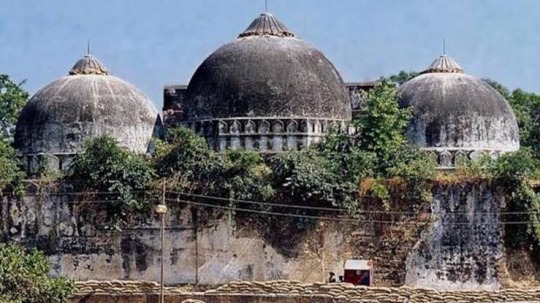
Ram Temple, 2024
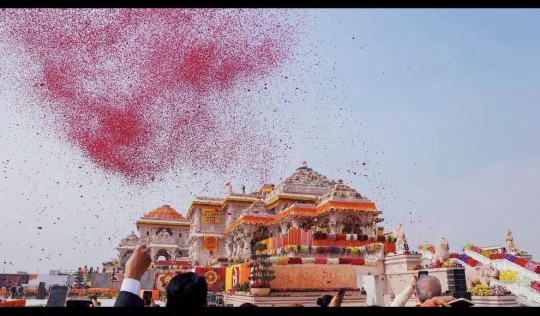
A bit of context for those who don’t know about the issue:
Babri Masjid, was a mosque in Ayodhya, India. It was built in the 16th century by the Mughal Empire. Babri Masjid was a holy place for the Muslims in the country. There’s a history of communalism (created by the British Empire) between Hindus (the majority religion) and Muslims (the minority) in the country.
In 1992, Babri Masjid was attacked and demolished by Hindu extremists who believed that the mosque was built on the site of birthplace of Ram (Hindu god). Thousands of people lost their lives. Thousands of Muslims were killed in cold blood by a hyper-nationalist state.
In 2010, after decades of Muslims fighting for justice, the Allahabad High Court upheld the claim that the mosque was built on Ram’s birth place. Muslims were also awarded one-third area of the site for the construction of a mosque. However, thr decision was subsequently appealed by all parties to the Indian Supreme Court, wherein a five judge bench heard a title suit from August to October 2019. On 9 November 2019, the Supreme Court quashed the lower court's judgement and ordered the entire site to be handed over to a trust to build the Hindu temple.
Today, 22nd January, 2024, marks the inaugural of the Ram Temple in Ayodhya. On a site that is so deeply entrenched within a community’s blood, pain and trauma. While these Hindu nationalists celebrate, every Muslim in the country feels more scared. Muslims in India have always been unlawfully detained, persecuted, punished and killed throughout the past seven decades but it has only worsened ever since BJP, the ruling party came in power. Celebrities, sportsperson, politicians and millions of people travelled to Ayodhya to celebrate this tremendous failure of the state.
Today, the Indian constitution lies under those thousands grave.
If any one of you celebrated, I hope you understand the gravity of your actions. I hope you understand what you all set in motion. I hope that one day, you understand and that there is no redemption for you after that.
I hope you all rot in hell.
Here’s a short poem by Rabindranath Tagore about an old god, a new temple, an arrogant king and many hungry and homeless ordinary people.
13 notes
·
View notes
Text
Indian Prime Minister Narendra Modi has inaugurated a grand temple to Hindu god Ram in the flashpoint city of Ayodhya.
He said it heralded "a new era" for India - the temple replaces a 16th-Century mosque torn down by Hindu mobs in 1992, sparking riots in which nearly 2,000 people died.
Top film stars and cricketers were among guests at the event in Ayodhya.
But some Hindu seers and most of the opposition boycotted it, saying Mr Modi was using it for political gain.
General elections are due in India in the next few months and Mr Modi's political rivals say the governing Bharatiya Janata Party (BJP) will be seeking votes in the temple's name in a country where 80% of the population is Hindu.
Critics have also accused the government of exploiting a religious celebration in a country which - according to its constitution - is secular. For Muslims, India's biggest minority, the event evoked fear and painful memories, members of the community in Ayodhya told the BBC in the run-up to Monday's ceremony.
Televised live, it showed Mr Modi performing religious rituals inside the temple's sanctum along with priests and Mohan Bhagwat, head of the Rashtriya Swayamsevak Sangh (RSS) - the ideological fountainhead of Hindu nationalist parties.
The complex history of India's Ayodhya holy site
Transforming a flashpoint holy city into the ‘Hindu Vatican’
"Today's date will go down in history," Mr Modi said after the event. "After years of struggle and countless sacrifices, Lord Ram has arrived [home]. I want to congratulate every citizen of the country on this historic occasion."
The temple has been constructed at a cost of $217m (£170m), funded from private donations. Only the ground floor was opened - the rest is expected to be completed by the end of the year. The construction work is part of a revamp for the city, estimated to cost more than $3bn.
The building of the Ram temple in Ayodhya fulfils a decades-long Hindu nationalist pledge. Many Hindus believe the Babri mosque was built by Muslim invaders on the ruins of a temple where the Hindu god was born.
The movement to build the temple helped propel the BJP into political prominence in the 1990s.
There was a festive atmosphere as tens of thousands of chanting Hindu devotees waved flags and beat drums - military helicopters showered flower petals on the temple. Saffron flags with pictures of Lord Ram line streets in the city festooned with marigolds, as do banners with the faces of Mr Modi and Uttar Pradesh Chief Minister Yogi Adityanath.
Some of India's biggest celebrities, including Bollywood star Amitabh Bachchan and cricketer Sachin Tendulkar, attended.
Temple rises from ruins of one of India’s darkest days
Listen: The temple at the heart of Modi's India re-election bid
Transforming a flashpoint holy city into the ‘Hindu Vatican’
In many other northern cities Hindus lit lamps, and saffron flags carrying images of Ram are fluttering on rooftops, including in several parts of Delhi. Cinemas screened the event, and big screens relayed pictures from Ayodhya to town squares and residential neighbourhoods.
The ceremony, called Pran Pratishtha, which loosely translates from Sanskrit into "establishment of life force", lasted about an hour. Hindus believe that chanting mantras and performing rituals around a fire will infuse sacred life in an idol or a photograph of a deity.
Several domestic TV stations built huge sets by the side of the river Saryu, a tributary of the Ganges, just behind the temple, and provided wall-to-wall coverage of the event, some proclaiming the moment of consecration as the start of "Ram Rajya" (Lord Ram's rule) in India.
Hindus celebrated the inauguration in other countries too. Massive billboards of Lord Ram graced Times Square in New York, where a group of devotees braved the freezing weather to gather in the middle of the night.
Temples all across the United Kingdom - where Indians are one of the largest diaspora groups - marked the event. Colourful posters had been shared inviting devotees to honour the occasion and celebrations involved flowers, sweets and music. There were also some celebrations in Muslim-majority Dubai - where Indians are a significant population - but from Indian news reports these appeared more muted than elsewhere.
In 2019, the Supreme Court gave the disputed land to Hindus after a protracted legal battle followed the mosque's demolition. Muslims were given a plot outside the city for a mosque but have yet to build one.
One member of the community the BBC spoke to in Ayodhya ahead of Monday's inauguration agreed that Hindus have the right to build the temple after the Supreme Court gave them the site.
"We did not accept that decision happily, but what can we do," he said. Another man said he was happy Hindus are building the temple - "but we are also sad because it was built after destroying a mosque".
The new three-storey temple - made with pink sandstone and anchored by black granite - stretches across 7.2 acres in a 70-acre complex. A 51-inch (4.25-ft) statue of the deity, specially commissioned for the temple, was unveiled last week. The idol has been placed on a marble pedestal in the sanctum sanctorum.
Thousands of police were deployed for Monday's event, despite Mr Modi having appealed to pilgrims not to turn up and to watch the ceremony on television. In many states a full or half day holiday was called, with schools and colleges closed and stock markets shut.
The build-up to a demolition that shook India
The man who helped Lord Ram win the Ayodhya case
But a sour note was struck with some top religious seers saying that as the temple was not yet complete, it was against Hinduism to perform the rituals there, and many opposition leaders deciding to stay away.
Some opposition-ruled states also announced their own plans for the day - West Bengal Chief Minister Mamata Banerjee said she would pray at the iconic temple to goddess Kali in Kolkata and then lead an all-faith rally. The eastern state of Odisha (Orissa) unveiled huge plans to bring pilgrims to the Jagannath temple in Puri, one of the holiest sites for Hindus.
Authorities say they expect more than 150,000 visitors per day once the temple in Ayodhya is fully ready.
To accommodate this expected rush, new hotels are being built and existing ones spruced up as part of a major makeover and in recent weeks, a new airport and railway station have opened.
Officials say they are building a "world-class city where people come as pilgrims and tourists", but many local people have told the BBC that their homes, shops and "structures of religious nature" have been either completely or partially demolished to expand roads and set up other facilities.
7 notes
·
View notes
Text
Hera Instagram Post!!
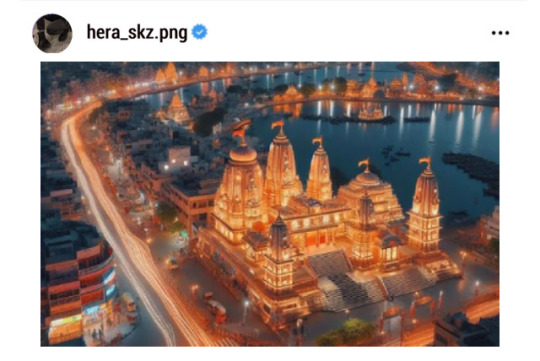
hera_skz.png The D-Day has come!
Today is a huge day for me and my fellow Indians. Today is the day our ancestors fought for generations on end!
I am grateful to be a part of this event and just wished to be there, in Ayodhya right now.
Let's all be a part of it as much as possible and hail to the almighty, Lord Ram!
Jai Shree Ram!
Liked by gnabnahc and 6,786,093 others
View all 50,897 comments
p.s.
Hera's this post was liked by all her kpop friends. Each one of the member shared this on their personal story and even acknowledged it on Bubble.
They are all incredibly supportive :)
Today is the 22nd of January. Our Indian Prime Minister has done everything and more to bring this day to us. Let's celebrate the homecoming of Lord Ram and celebrate this new day as Deepavali.
I am a proud Indian Stay!
Jai Shree Ram!
#skz Hera stray kids 9th member#stray kids#stray kids 9th member#9th member of skz#9th member of stray kids#bang chan#lee know#changbin#hyunjin#han jisung#lee felix#felix#seungmin#i.n#bang chan imagines#lee know imagines#changbin imagines#seo changbin#hyunjin imagines#han imagines#felix imagines#seungmin imagines#i.n imagine#stray kids oc#stray kids female member#kpop female oc#kpop imagines#skz hera#ram mandir#jai shree ram
13 notes
·
View notes
Text
Seek Lord Ram's Forgiveness, Because…": PM Modi On Ayodhya Temple
Addressing the large gathering after the 'pran pratistha' rituals at the grand Ram Temple in Ayodhya, Prime Minister Narendra Modi today said, "Our Ram has finally arrived."
"I have come before you are witnessing the divine consciousness in the temple's sanctum sanctorum. There's so much to say but, but there's a lump in my throat. After unprecedented patience, innumerable sacrifices and penance, our Lord Ram has arrived. I congratulate the country on this occasion," the Prime Minister said.

Ram Lalla, he said, will "no longer live in a tent". Saying that this moment of consecration is a blessing from Lord Ram, he said January 22 is "not a date on a calendar, but the dawn of a new era".
Equating the consecration ceremony with breaking free of a mindset of slavery, he said it is a blessing that we are alive to witness this historic event. "Even after thousands of years, people will remember this date, moment. It is Ram's supreme blessings that we are witnessing it," he said. He also sought forgiveness from the deity and said there must have been some lapse because of which it took so long to reach this point.
Saying that "Ram's existence was questioned", the Prime Minister said, "In India's Constitution, in its first page, there's Lord Ram. I thank the Supreme Court for maintaining the dignity of law."
Some people, he said, had warned that the construction of the Ram Temple will light a fire. "Such people could not understand the purity of India's social consciousness. The construction of this temple of Ram Lalla is also a symbol of the Indian society's peace, patience and mutual harmony. We can see this has not given birth to a fire, but an energy," he said.
"Ram is not a fire, he is an energy. Ram is not a dispute, he is a solution. Ram is not just ours, he is everyone's," the Prime Minister said, adding, "Today, we did not just see the pran pratishtha of Ram Lalla's idol, but also the pran pratishtha of the unbreakable unity of India."
Laying down a vision for the country's development in the future, the Prime Minister said, "Ram's temple has been built. Now what? Every citizen's consciousness should extend from dev (god) to desh (country) and from Ram to rashtra (nation)."
2 notes
·
View notes
Text
#purvanchalsamachar#india news#up news#today up news#today ayodhya news#ayodhya ram mandir news#ayodhya news#pm modi news#modi news#utter pradesh news
0 notes
Text
When you read Valmiki Ramayana and see how the processes and preparation for Ram's coronation you can't help but feel terrible for Ram.
People all excited to welcome Ram. He hears some people talking how Ram on ascending the throne would mean peace and prosperity for many years to come. Dignitaries have come from all over the country, like a full public event. Ram looks so regal only to let go all of it in a few moments unaware of his mother Kaikeyi's intentions
And this man I know why our elders would advise us to look upto Ram. This man after getting a terrible blow and getting an exile akin to a death sentence from his mother who loved him dearly and was even so happy with the news of Ram's coronation. He is then asked to leave the palace immediately for 14 years like never once come back for 14 years.
Keeping myself in Ram's position to not come back home once for so many years would kill me. I don't think I would give any thought about promises dharma or karma then when I would be told to go away.
And do you all realize that he was giving up an empire which was rightfully his? To learn from Ram, I think we must learn to keep ourselves in his position and think what our step would be and see the difference between Ram's behaviour and thoughts and us.
It's like you are told that you will have a promotion at work and get a high position. Everything is set. The people, your new cabin, your new post everything and once you come to office to begin your duties you are told that you won't get promotion without stating what you did wrong or where your efforts lacked.
Tell me how would you feel?
This is similar to Ram's case too. For him promotion would mean to be the king and take control of a grand empire. You must see how Valmiki describes Ayodhya. I would love to live there.
And when he is walking back to his own palace (ram and sita lived in a separate palace away from Dasharath's) he doesn't use the parasol and the chariot.
Today every person whom I talk too regarding Ram, I see everyone getting angry and pointing faults at him.
This is epic Kaikeyi behaviour. Kaikeyi after getting her mind poisoned not once does she think of ram and her relationship with him, his qualities, etc. We too do the same thing. All this while I always said Ram shouldn't have done this should not have done that why should Ram be idealized?
Growing up I realise why dada dadis would tell us to be like Ram. You can be steady and calm in good situations how do you keep your self steady and calm when life is being unfair to you? We all slip into sadness, submit to grief and anger and worse into all sorts of terrible addictions to cope with it.
And what did we do to Ram? Forget learning from him, we politicise him. Ram is a tool for vote bank, Jai Shri Ram is a war cry and shit like that.
Kaikeyi was unfair to Ram and so are we. We are no better.
Just like what my elders did, I am going to tell my children and the upcoming generation about Rama and to be like him.
Jai Shri Ram 🙏
#samridhi speaks#ramayana#this post... yesterday I was listening to valmiki ramayan by 21notes on youtube#when this part came up I turned so emotional and had to write this in the. morning#I was in a terrible phase two years back and keep falling back into the same spiral again and again sometimes#Ram is the only one who shall keep me going#this man gave up entire kingdom and riches#I only have a neet exam to pass#but yes today's kids who don't read the epics and think it to be boring you all be missing out so many important lessons#also I am so thankful that my first books given to me to read were panchatantra#ramayana mahabharat and hitopadesha#I read ramayana and mahabharata when I was in nursery and I thank the Gods for it
17 notes
·
View notes
Note
hi im tamil but im not familiar with the ram mandir thing what is it?
hi i'm so sorry but I've had a long day and therefore don't have the bandwidth to answer this in detail... but you're free to google things like "1992 babri masjid demolition", "2019 ayodhya case verdict" and other similar things from reputed news sources. thank you for asking me and I'm sorry that i can't discuss this in detail today.
1 note
·
View note
Video
Today latest News | Ayodhya News | UP News | Breaking News | Nav Bharat ...
2 notes
·
View notes